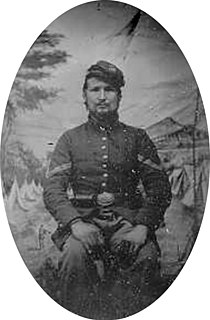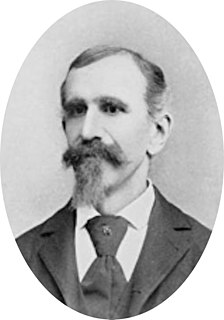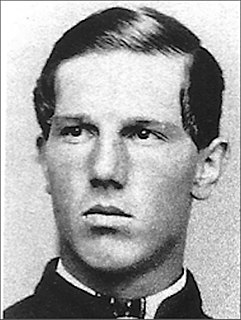
Frederick Randolph Jackson (February 18, 1844 - February 14, 1925) was an American soldier and recipient of the Medal of Honor who earned the award for his actions during the American Civil War.

Frederick Randolph Jackson (February 18, 1844 - February 14, 1925) was an American soldier and recipient of the Medal of Honor who earned the award for his actions during the American Civil War.
Jackson was born in New Haven, Connecticut on February 18, 1844. [1] He served as first sergeant in Company F of the 7th Regiment Connecticut Volunteer Infantry. [2] [3] He earned his medal in action at James Island, South Carolina on June 16, 1862. [2] By the end of the war he had reached the rank of Sergeant Major. [2] His medal was issued in 1862. [1] He died in Smithville, New York on February 14, 1925, and is buried in Smithville Cemetery, Smithville, New York. [1]
For extraordinary heroism on 16 June 1862, in action at James Island, South Carolina. Having his left arm shot away in a charge on the enemy, First Sergeant Jackson continued on duty, taking part in a second and a third charge until he fell exhausted from the loss of blood. [1]

William Harvey Carney was an American soldier during the American Civil War. Born as a slave, he was awarded the Medal of Honor in 1900 for his gallantry in saving the regimental colors during the Battle of Fort Wagner in 1863. The action for which he received the Medal of Honor preceded that of any other African American Medal of Honor recipient; however, his medal was actually one of the last to be awarded for Civil War service. African Americans received the Medal of Honor as early as April 1865.

The United States Colored Troops (USCT) were regiments in the United States Army composed primarily of African-American (colored) soldiers, although members of other minority groups also served within the units. They were first recruited during the American Civil War, and by the end of the war in 1865, the 175 USCT regiments constituted about one-tenth of the manpower of the Union Army. About 20% of USCT soldiers died, a rate about 35% higher than that of white Union troops. Many USCT soldiers fought with distinction, with 16 receiving the Medal of Honor and numerous others receiving other honors.

Andrew Jackson Smith was a Union Army soldier during the American Civil War and a recipient of America's highest military decoration the Medal of Honor for his actions at the Battle of Honey Hill.

William Edgar Simonds was a United States Representative from Connecticut and a recipient of the U.S. military's highest award, the Medal of Honor, for his actions as a soldier in the American Civil War.

Henry M. Fox was a Union soldier during the American Civil War, and a Medal of Honor recipient.

Frederick W. Füger was an enlisted man and officer in the U.S. Army. He received the Medal of Honor for gallantry during the Battle of Gettysburg while defending the Union position on Cemetery Ridge against Pickett's Charge on July 3, 1863.
Battery G, 1st Rhode Island Light Artillery Regiment was an artillery battery that served in the Union Army during the American Civil War.
The 127th Regiment, Illinois Volunteer Infantry was an infantry regiment in the Union Army during the American Civil War.
Sergeant James H. Burbank was a Dutch soldier who fought in the American Civil War. Burbank received the United States' highest award for bravery during combat, the Medal of Honor, for his action at Blackwater, near Franklin, Virginia on 3 October 1862. He was honored with the award on 27 July 1896.

Private Orlando Emanuel Caruana was a Maltese-born American soldier who fought in the American Civil War. Caruana received the country's highest award for bravery during combat, the Medal of Honor, for his action during the Battle of New Bern in North Carolina on March 14, 1862 and the Battle of South Mountain in Maryland on September 14, 1862. He was honored with the award on November 14, 1890.
The 21st Connecticut Infantry Regiment was an infantry regiment that served in the Union Army during the American Civil War.
Sergeant George Henry Doré was an English soldier who fought in the American Civil War. Doré received the United States' highest award for bravery during combat, the Medal of Honor, for his action during the Battle of Gettysburg in Pennsylvania on 3 July 1863. He was honored with the award on 1 December 1864.
Sergeant Daniel G. Caldwell was an American soldier who fought in the American Civil War. Caldwell received the country's highest award for bravery during combat, the Medal of Honor, for his action during the Battle of Hatcher's Run in Virginia on 6 February 1865. He was honored with the award on 25 February 1865.
The 119th Regiment, Illinois Volunteer Infantry was an infantry regiment in the Union Army during the American Civil War.

Conrad Noll (1836–1925) was a German-born soldier who fought for the Union in the U.S. Civil War. He received the Medal of Honor for his actions during the Battle of Spotsylvania as a member of the 20th Michigan Infantry. He was born in Germany on February 20, 1836 and died in Ann Arbor, Michigan on May 26, 1925. He is buried in the Forest Hill Cemetery of Ann Arbor.

Stephen Rought was a sergeant in the United States Army who was awarded the Medal of Honor for gallantry during the American Civil War. He was awarded the medal on 1 December 1864 for actions performed in May 1864 in the Battle of the Wilderness in Virginia.

Frederick W. Swift was a Colonel of the United States Army who was awarded the Medal of Honor for gallantry in the American Civil War. He was awarded the medal on 15 February 1897 for actions performed at the Battle of Lenoir's Station in Tennessee in November 1863.

George Schneider was a sergeant in the United States Army who was awarded the Presidential Medal of Honor for gallantry during the American Civil War. He was awarded the medal on 27 July 1896 for actions performed at the Battle of the Crater in Virginia on 30 July 1864.
John Kelley was an Irish born recipient of the Medal of Honor and sailor in the Union Navy during the American Civil War.

Joseph Bell Kemp was an American recipient of the Medal of Honor and soldier in the Union Army during the American Civil War.